"News"
Pls, contact me in need: pastirikova.gma@gmail.com
0x v známkach v internetovej žiackej knižke znamená, že máte možnosť do 3 týždňov od dátumu písania testu/písomky napísať príslušný test/písomku po skončení vyučovania čas
Písomky sa dopisujú vždy len v stredu!!!!!!!!!! uč.105
I am truly sorry you found some unpleasant x-es in your IZK but that is the way things are. Do not want me to remind you that you have to come and take the test no matter what reasons for your absence in my lesson were. Three weeks is just enough time for you to learn, revise, prepare, come and take the test. I cannot wait more than three weeks until you bless me with your presence
Why is English important?
English is an international language. Probably more than any other language in the world, English
is used in international relations, business, politics, education, tourism, science, and technology. It
is a language used globally for practically every major aspect of our lives.
There are at least several reasons why many people choose to study English:
1) to prepare for English examinations or school
2) to travel or study abroad
3) for a job
4) to watch original English films
5) to read English fiction and non-fiction literature
6) to understand lyrics/music
•Strategies for Learning English
• Practice your speaking as often as possible by participating in any and all conversations in English, whether it is chatting, whether you’re in the classroom, and whether you’re with a teacher or on-line social nets. Memorization and studying from the textbooks are simply not enough.
- Participate in any and all class activities: this includes pair-work and group-work speaking activities as well as reviewing. Remember, reviewing the old materials and practicing your English skills in different ways are essential when learning a foreign language.
• Know your grammar: this is necessary to develop your writing skills and assist you in speaking.
• Do your homework consistently and well.
• Take notes: especially regarding sentence structures, grammar, new vocabulary, any important expressions, translations, etc. This way, you can review your notes at a later time and remember the information.
• Practice your English outside the class: visit chat websites, listen to audio books, change the language to English on all the gadgets you have (mobile phone, laptop or tablet), find an English-speaking friends, get vocabulary app for your phone, go on holiday in an English-speaking country.
• Be exposed to how English is used in different contexts and in different styles: watch foreign English films, watch the English news, listen to an English radio station, or read an English newspaper.
• Strategies for Learning English
• Preview the lesson in the textbook • Look up any words you don’t know in the dictionary.
• Have at least English notebooks with you for taking notes. • Have good writing habits.
• Find a friend or classmate and write an English dialogue together. Then present it to the class.
• Study with a friend or group. You may learn more from each other than just studying by yourselves.
• Find an English friend and write to each other in English.
• Make flashcards to memorize any important vocabulary and useful English expressions: e.g., one side may have English while the other side may have the translation or illustration.
• When memorizing the spelling of any new and difficult words, use this method:
1.) Copy the word. 2.) Cover the word. 3.) Memorize and write the word.4.) Uncover and check the spelling. 5.) If the spelling is incorrect, then repeat steps 1-4 until you have fully memorized the spelling. Then move on to another difficult word and use the same process. (A similar method could also be used for memorizing key phrases and sentences).
• Listen to the CD, watch videos and read the stories out loud many.
• Monitor and assess your own speaking, for example, by recording your voice. Then compare it with the native speaker’s voice in the original recording. Fix any errors in your pronunciation, intonation, and fluency.
http://www.learningmethods.com/lmtrain.htm
Learning Methods Online
E-learning and Distance LearningWhat is it and how does it work?
— the web sites with a range of resources: relevant articles, scientific papers, audio and video recordings, etc.,
— a library of hundreds of workshops and classes on a wide range of topics available for download.
HOW TO BE BETTER AT ENGLISH IF YOU ARE THIS TYPE OF LEARNER:
TO IMPROVE AS A VISUAL LEARNER…
visualize what you are studying
use color in your notes (colored pens, highlighters, etc.)
visualize what the instructor is lecturing about
draw pictures and diagrams
use mind maps in your notes
use picture and graphics to reinforce learning
learn from videos
TO IMPROVE AS AN AUDITORY LEARNER…
listen to tapes of recorded assignments
tape record your own textbook reading
read out loud
talk over ideas from class and what you are studying with other students
participate in class discussions
listen to audiotapes on the subject
TO IMPROVE AS A HANDS ON LEARNER…( a kinaesthetic learner)
stand up and move around while you are studying
take frequent breaks while studying
make use of your hands and write things down as you study
use the computer to reinforce learning
be physically active; experiment with objects
memorize or drill while walking or exercising
USEFUL PHRASES AND EXPRESSIONS
BOX 1: How to describe a Picture(ako opísať obrázok)
In this picture , there is a ... I can see a/some ...
In the top right/left corner, there is a/there are some ...
At the bottom of the picture there is a/there are some ...
In the middle there is a/there are some ...
Both pictures shows ...
BOX 2: How to describe a strange object (ako opísať neznámy predmet)
It’s a thing/stuff/something ...
It looks like...
It reminds me of...
It’s a kind of ... sort of...
This object looks strange.
I have never seen anything like this before.
BOX 3: How to describe a place (ako opísať miesto)
It’s famous for...
It’s one of the most famous/beautiful ... in...
It is situated in the south/north/west/east
It is situated on the river...
It is known as...
You should definitely visit...
...is worth seeing...
...is worth a visit.
BOX 4: How to compare (ako porovnávať)
alike,like, similar to, just as, the same as, more or less the same as, identical, equivalent, likewise, comparable to
They are almost identical/almost the same/more or less the same...
In the first picture... while in the other one...
The... in the first picture shows ... whereas the... in the second picture shows...
BOX 5: How to contrast (ako vyjadriť rozdiely)
Unlike, different, in contrast, whereas, is different from, slightly/completely different from, on the other hand, conversely, but, more than, less than, worse than, better than
These two pictures differ a bit/quite a lot because...
The biggest difference between these pictures is...
There are few differences between...
BOX 6: How to talk about advantages and disadvantages
(ako hovoriť o výhodách a nevýhodách)
There are few advantages of...
The first advantage is that...
I can see another advantage in that...
Besides this...
I can see more advantages than disadvantages...
BOX 7: How to express opinion (ako vyjadriť názor)
I think/believe/feel..
I’m quite/fairly certain that...
I am pretty sure that...
In my opinion/view..
I imagine/suppose/reckon...
As I see it.../As far as I can see...
It appears to me/seems to me...
It’s quite obvious that...
Some people might think...
According to some people..
BOX 8: How to agree with an opinion (ako súhlasiť s názorom)
I agree (completely/entirely).
Exactly. Absolutely. Definitely.
That’s right/true. Fair enough.
I suppose so. I think so.
I couldn’t agree more.
That’s exactly what I think.
That’s what I was going to say.
That’s a good point.
BOX 9: How to disagree with an opinion (ako nesúhlasiť s názorom)
Yes, but...
That’s true but...
I agree with you, but...
That’s a good idea, but...
You’re right, but...
I see/take your point, but...
Well, you have a point there, but...
I see what you mean, but...
To a certain extent yes, but...
I can see why you say that, but...
In most cases you would be right, but...
Forgive me if I’m wrong, but...
Yes, but it has to do more with...
I agree in theory, but...
I don’t think so.
That’s one way at looking at it.
Personally, I’m more inclined to agree with...
I’m sorry, but I really can’t agree.
I’m not really sure.
BOX 10: How to give reasons, arguments and examples (ako uviesť dôvody a príklady, ako argumentovať)
Firstly.../Secondly...
The first reason is...
To start with...
And on the top of that...
For one thing...
And for another...
For example...
For instance...
Let’s see an example.
BOX 11: How to start an informal conversation (ako začať spoločenskú konverzáciu)
Hi, Tim, is that you?
I haven’t seen you for a long time.
Tim, how have you been?
Tim, you look great!
It’s been a while, hasn’t it?
So, how are you enjoying the party?
Hell, you must be Sonia’s brother.
BOX 12: How to start a formal conversation with strangers
(ako začať spoločenskú konverzáciu s neznámymi ľuďmi)
Are you here for business or pleasure?
Don’t you happen to know what time it is?
Hello, are you enjoying the party?
Excuse me, is this seat taken?
Hi. I haven’t heard that you come from England. Do you?
Is this your first visit to Slovakia?
The weather is awful, isn’t it?
I’m sorry to trouble you, but haven’t we met before?
BOX 13: How to finish a conversation (ako ukončiť konverzáciu)
It was great to see you/to talk to you again.
I wish I had more time, but I really have to go now.
I am afraid that getting late.
Well, I’d rather go now.
I’ve got to go now, see you.
BOX 14: How to give recommendations and advice (ako odporúčať a radiť)
I’d really recommend...
You must/should certainly try...
Be careful with...
Don’t forget to...
Don’t be surprised if...
Always remember to...
You should expect people to...
It’s polite to...
I wouldn’t recommend...
If I were you, I wouldn’t...
You’d rather didn’t...
You shouldn’t...
Personally, I wouldn’t...
You should never...
BOX 15: How to make polite request (ako zdvorilo o niečo žiadať)
Excuse me, can I...?
Would you mind... /ing? Do you mind if I...?
Can you/Could you..., please?
Could I have..., please?
Is it all right if I...?
Could you possibly ...?
Do you think you could ... for me,please?
May I...?
BOX 16: How to invite, accept and refuse an invitation (ako pozvať, ako prijať a odmietnuť pozvanie)
Do you feel like ................. –ing? How about ............... –ing?
Do you fancy ...............-ing?
Would you like to...?
I was wondering if you’d like to …
ACCEPTING AN INVITATION (prijatie pozvania)
Yes, I’d love to.
That would be great. Thanks.
Thank you very much. That would be lovely.
REFUSING AN INVITATION (odmietnutie pozvania)
We can‘t, I‘m afraid.
Sorry, but we’re busy.
What a shame!
I’d love to, but...
That’s very kind of you, unfortunately, ...
Well, actually, ...
BOX 17: How to offer help, accept and refuse help (ako ponúknuť, prijať a odmietnuť pomoc)
Shall I ... for you?
Can I help you?
I’ll do it for you.
ACCEPTING HELP (prijatie pomoci)
Thank you. That’s very kind of you.
REFUSING HELP (odmietnutie pomoci)
It’s all right. Thanks. I can manage.
BOX 18: How to read charts and graphs (ako čítať tabuľky a grafy)
In looking at the figures in this pie chart, we can see that...
If you look at this bar chart, you can see...
TO INCREASE: to go up, to climb, to rise, to grow, to peak, to expand, to boom, to recover
TO DECREASE: to go down, to fall, to drop, to decline, to shrink, to bottom out
TO REMAIN STABLE: to remain steady, to stand still, to remain constant, to remain the same, to stay steady, to remain level, to fluctuate, to oscillate
One of the essential skills which u should be good at, and which, in fact, is tested at the oral part of your final exam is speaking. Not only about the topic given, but you are going to describe pictures as well. Just to help you a bit with it, you can find here some prompts/hints which might help you.
DESCRIBING PICTURES
-
Start by saying what the picture shows in general.
The picture shows a street of a terraced houses in a city.
-
Use the Present Continuous
to describe what people are doing.
There are two old men on the roght who are chatting.
-
Talk about what you can see in more detail.
-
Use the following phrases to describe
where things are:
in the background/middle/foreground
at the bottom/top
on the right/left
There’s somebody washing his car in the background.
-
Use phrases like perhaps and (it) might be
if you are making a guess.
It might be in Britain.
Perhaps it’s in Germany.
-
Use it looks + adjective to show how you feel about the picture.
It looks very friendly.
Describing pictures in English
http://learnenglishteens.britishcouncil.org/exams/speaking-exams/describe-photo-or-picture
1. Introduction
- The photo/picture shows ...
- It was taken by/in ...
- It's a black-and-white/coloured photo.
2. What is where?
- In the foreground/background you can see ...
- In the foreground/background there is ...
- In the middle/centre there are ...
- At the top/At the bottom there is ...
- On the left/right there are ...
- Behind/In front of ... you can see ...
- Between ... there is ...
3. Who is doing what?
Here you decribe the persons in the picture or you say what is happening just now. Use the Present Progressive.
4. What I think about the picture
- It seems as if ...
- The lady seems to ...
- Maybe ...
- I think ...
- ... might be a symbol of ...
- The atmosphere is peaceful/depressing ...
- I (don't) like the picture because ...
- It makes me think of ...



LINKING WORDS
As well as
Also
Too
Furthermore
Moreover
Apart from
In addition to
BesidesIdeas are often linked by and. In a list, you put a comma between each item, but not before and.
"We discussed training, education and the budget."
Also is used to add an extra idea or emphasis. "We also spoke about marketing."You can use also with not only to give emphasis.
"We are concerned not only by the costs, but also by the competition."We don't usually start a sentence with also. If you want to start a sentence with a phrase that means also, you can use In addition, or In addition to this…
As well as can be used at the beginning or the middle of a sentence.
"As well as the costs, we are concerned by the competition."
"We are interested in costs as well as the competition."Too goes either at the end of the sentence, or after the subject and means as well.
"They were concerned too."
"I, too, was concerned."Apart from and besides are often used to mean as well as, or in addition to.
"Apart from Rover, we are the largest sports car manufacturer."
"Besides Rover, we are the largest sports car manufacturer."Moreover and furthermore add extra information to the point you are making.
"Marketing plans give us an idea of the potential market. Moreover, they tell us about the competition."Summarising
In short
In brief
In summary
To summarise
In a nutshell
To conclude
In conclusionWe normally use these words at the beginning of the sentence to give a summary of what we have said or written.
Sequencing ideas
The former, … the latter
Firstly, secondly, finally
The first point is
Lastly
The followingThe former and the latter are useful when you want to refer to one of two points.
"Marketing and finance are both covered in the course. The former is studied in the first term and the latter is studied in the final term."
Firstly, … secondly, … finally (or lastly) are useful ways to list ideas.
It's rare to use "fourthly", or "fifthly". Instead, try the first point, the second point, the third point and so on.
The following is a good way of starting a list.
"The following people have been chosen to go on the training course: N Peters, C Jones and A Owen."Giving a reason
Due to / due to the fact that
Owing to / owing to the fact that
Because
Because of
Since
AsDue to and owing to must be followed by a noun.
"Due to the rise in oil prices, the inflation rate rose by 1.25%."
"Owing to the demand, we are unable to supply all items within 2 weeks."
If you want to follow these words with a clause (a subject, verb and object), you must follow the words with the fact that.
"Due to the fact that oil prices have risen, the inflation rate has gone up by 1%25."
"Owing to the fact that the workers have gone on strike, the company has been unable to fulfill all its orders."
Because / because of
Because of is followed by a noun.
"Because of bad weather, the football match was postponed."
Because can be used at the beginning or in the middle of a sentence. For example, "Because it was raining, the match was postponed."
"We believe in incentive schemes, because we want our employees to be more productive."
Since / as
Since and as mean because.
"Since the company is expanding, we need to hire more staff."
As the company is expanding, we need to hire more staff."
Giving a result
Therefore
So
Consequently
This means that
As a resultTherefore, so, consequently and as a result are all used in a similar way.
"The company are expanding. Therefore / So / Consequently / As a result, they are taking on extra staff."
So is more informal.
Contrasting ideas
But
However
Although / even though
Despite / despite the fact that
In spite of / in spite of the fact that
Nevertheless
Nonetheless
While
Whereas
Unlike
In theory… in practice…But is more informal than however. It is not normally used at the beginning of a sentence.
"He works hard, but he doesn't earn much."
"He works hard. However, he doesn't earn much."Although, despite and in spite of introduce an idea of contrast. With these words, you must have two halves of a sentence.
"Although it was cold, she went out in shorts."
"In spite of the cold, she went out in shorts."Despite and in spite of are used in the same way as due to and owing to. They must be followed by a noun. If you want to follow them with a noun and a verb, you must use the fact that.
"Despite the fact that the company was doing badly, they took on extra employees."
Nevertheless and nonetheless mean in spite of that or anyway.
"The sea was cold, but he went swimming nevertheless." (In spite of the fact that it was cold.)
"The company is doing well. Nonetheless, they aren't going to expand this year."While, whereas and unlike are used to show how two things are different from each other.
"While my sister has blue eyes, mine are brown."
"Taxes have gone up, whereas social security contributions have gone down."
"Unlike in the UK, the USA has cheap petrol."
In theory… in practice… show an unexpected result.
"In theory, teachers should prepare for lessons, but in practice, they often don't have enough time."
ALL VS WHOLE
http://www.grammarbank.com/all-vs-whole.html
1. The word order is different:
All + the + noun
The + whole + noun
I have read the whole book.
I have read all (of) the book.
2. We don’t use whole with uncountable nouns. It is mostly used with singular countable nouns.
Anderson spilled all the water on his laptop. (not … the whole water)
The whole town burnt down in a big fire in 1886.
3. They both can be used with plural countable nouns, but with different meanings.
All of the students failed in the exam. (every student)
I need to finish three whole books by the end of the week. (entire books)
4. Whole can be used after a possessive adjective, however, all must be used before a possessive adjective.
My whole life / all my life
My whole day / all my day
5. All has a meaning similar to every, but it is used with a plural noun.
Every student deserves a talented teacher.
All students deserve a talented teacher.PRACTISE:
http://www.grammarbank.com/all-vs-whole-exercise.html
BEEN or GONE
With the present perfect tense we can use both been and gone.
Been is the past participle of be.
Gone is the past participle of go.
Use been to describe completed visits. If you have visited a place on holiday and then returned you have been there.
If someone visits a place but has not come home they have gone there.
She's been to India on holiday three times.
She's gone to Moscow, she will be back next week.
When you ask someone about their past experiences use been.
You smell of beer! Have you been drinking?
Have you ever been to Paris?Note: In British English 'been and gone' is an expression which means someone/something came along and then left.
Has John arrived yet?
He's been and gone. He was here but he had to leave suddenly.What time does the postman usually come?
He's been and gone. There was no post for you today.PRACTISE:
http://www.ecenglish.com/learnenglish/lessons/been-or-gone
FREQUENT MISTAKES
Below are some of the most common English mistakes made by ESL students, in speech and in writing.
-
Wrong I have visited Niagara Falls last weekend. Right I visited Niagara Falls last weekend. -
Wrong The woman which works here is from Japan. Right The woman who works here is from Japan. -
Wrong She’s married with a dentist. Right She’s married to a dentist. -
Wrong She was boring in the class. Right She was bored in the class. -
Wrong I must to call him immediately. Right I must call him immediately. -
Wrong Every students like the teacher. Right Every student likes the teacher. -
Wrong Although it was raining, but we had the picnic. Right Although it was raining, we had the picnic. -
Wrong I enjoyed from the movie. Right I enjoyed the movie. -
Wrong I look forward to meet you. Right I look forward to meeting you. -
Wrong I like very much ice cream. Right I like ice cream very much. -
Wrong She can to drive. Right She can drive. -
Wrong Where I can find a bank? Right Where can I find a bank? -
Wrong I live in United States. Right I live in the United States. -
Wrong When I will arrive, I will call you. Right When I arrive, I will call you. -
Wrong I’ve been here since three months. Right I’ve been here for three months. -
Wrong My boyfriend has got a new work. Right My boyfriend has got a new job. (or just "has a new job") -
Wrong She doesn’t listen me. Right She doesn’t listen to me. -
Wrong You speak English good. Right You speak English well. -
Wrong The police is coming. Right The police are coming. -
Wrong The house isn’t enough big. Right The house isn’t big enough. -
Wrong You should not to smoke. Right You should not smoke. -
Wrong Do you like a glass of wine? Right Would you like a glass of wine? -
Wrong There is seven girls in the class. Right There are seven girls in the class. -
Wrong I didn’t meet nobody. Right I didn’t meet anybody. -
Wrong My flight departs in 5:00 am. Right My flight departs at 5:00 am. -
Wrong I promise I call you next week. Right I promise I’ll call you next week. -
Wrong Where is post office? Right Where is the post office? -
Wrong Please explain me how improve my English. Right Please explain to me how to improve my English. -
Wrong We studied during four hours. Right We studied for four hours. -
Wrong Is ready my passport? Right Is my passport ready? -
Wrong You cannot buy all what you like! Right You cannot buy all that you like! -
Wrong She is success. Right She is successful. -
Wrong My mother wanted that I be doctor. Right My mother wanted me to be a doctor. -
Wrong The life is hard! Right Life is hard. -
Wrong How many childrens you have? Right How many children do you have? -
Wrong My brother has 10 years. Right My brother is 10 (years old). -
Wrong I want eat now. Right I want to eat now. -
Wrong You are very nice, as your mother. Right You are very nice, like your mother. -
Wrong She said me that she liked you. Right She told me that she liked you. -
Wrong My husband engineer. Right My husband is an engineer. -
Wrong I came Australia to study English. Right I came to Australia to study English. -
Wrong It is more hot now. Right It’s hotter now. -
Wrong You can give me an information? Right Can you give me some information? -
Wrong They cooked the dinner themself. Right They cooked the dinner themselves. -
Wrong Me and Johnny live here. Right Johnny and I live here. -
Wrong I closed very quietly the door. Right I closed the door very quietly. -
Wrong You like dance with me? Right Would you like to dance with me? -
Wrong I go always to school by subway. Right I always go to school by subway. -
Wrong If I will be in London, I will contact to you. Right If I am in London, I will contact you. -
Wrong We drive usually to home. Right
We usually drive home.
Zapamätajte si, že väzba IN THESE DAYS v angličtine neexistuje. Slovenskému spojeniu “v dnešnej dobe / dnes” zodpovedá v angličtine väzba “THESE DAYS“, ktorú však zaraďujeme do menej formálneho štýlu.
Medzi neutrálne príslovky s týmto významom patrí NOWADAYS.
- Nowadays people live longer…
- These days children keep on watching TV.
- Politicians make promises they don’t mean to keep these days.
V hovorovej angličtine sa v tomto význame môžete stretnúť aj s výrazom TODAY.
Možno ste sa niekedy stretli s väzbou IN THOSE DAYS. Takéto slovné spojenie existuje, no používa sa iba pri opise minulosti s významom “vtedy – v tej dobe“.
- In those days young people didn’t have a lot of money to spend on themselves.
Bežne a často používate “According to me …”? Viete o tom, že je to jedna z ďalších častých chýb? Chcete sa jej vyhnúť? Preštudujte si potom tento článok.
Ak sa nás v slovenčine niekto spýta na náš názor, často začíname vetu väzbou “PODĽA MŇA …” Keďže “PODĽA ČOHO” v angličtine prekladáme ako ACCORDING TO, logicky teda vyplýva, že “PODĽA MŇA” by sme mali preložil ako ACCORDING TO ME. Avšak, to je chyba! Ako je to možné?
- According to me, you should drink two bottles of milk a day.
- According to me, he should call her.
- According to me, you should eat more.
V angličtine teda takáto väzba nie je v poriadku. ACCORDING TO používame vtedy, keď ide o informáciu získanú z “iného zdroja” (= osoby). Angličtina túto väzbu nespája s prvou osobou jednotného ani množného čísla. Namiesto toho sa používajú väzby so slovami OPINION a VIEW, či slovesami THINK, BELIEVE apod.
- In my opinion, you should drink two bottles of milk a day.
- In my view, he should call her.
- From my point of view, it wasn’t her fault.
- To my mind this one is much better.
- I think you should eat more.
Ak teda nevyjadrujeme svoj názor, ale názor niekoho iného, väzbu ACCORDING TO použiť môžeme.
- According to him, I am cleverer than I look.
- According to my mother, it’s all for my own good.
LOOK AFTER
postarať sa o koho/čo, starať sa o koho/čo
- I look after my brother while my mother is away.
- I don’t know but there needs to be someone to look after young kids like you that lose someone.
LOOK BACK (ON)
bilancovať čo (pozerať sa späť, obzrieť sa)
Premýšľame o niečom, čo sa stalo v minulosti – používame frázové sloveso LOOK BACK (ON).
- I just have to look back on all the good times I had with him.
LOOK DOWN ON
povyšovať sa nad koho
LOOK DOWN ON používame vo význame myslieť si, že niekto je lepší alebo dôležitejšie ako niekto iný.
- He never looked down on anyone, he was such a good person.
LOOK FOR
hľadať koho/čo, pátrať po kom/čom
- No one understands why we lose such important people but we just have to look for peace within ourselves.
LOOK FORWARD TO
tešiť sa na čo
- I am looking forward to seeing you.
- I am looking forward to you.

Po LOOK FORWARD TO nasleduje ďalšie sloveso v gerundiu (s ing príponou). TO v tomto prípade nie je časť infinitívu, ale predložka “NA”, po ktorej ak nasleduje sloveso, musí byť v tvare gerundia.
LOOK INTO
skúmať čo (problém, prípad ap.), zaoberať sa čím, prešetriť niečo
LOOK INTO používame, ak skúmame nejaké fakty o problémoch, situáciach, dejoch apod.
- We need to divide up the work and look into the research that needs to be done.
LOOK ON
prizerať sa na čo/čomu
LOOK ON používame vtedy, ak hovorím, že sa na niečo pozeráme, niečomu sa prizeráme, no bez toho, aby sme sa do činnosti, ktorú pozorujeme aktívne zapojili.
- You can look on as the animals continue their daily activities.
LOOK OVER
prezrieť (si), preletieť čo (zbežne skontrolovať)
Ak niečo veľmi rýchlo preletíme (prečítame, preskúmame…), používame LOOK OVER.
- Let me look over the observations you took down.
- I looked over the text because I didn’t have time.
LOOK OUT
Pozor!
- Look out! Somebody is coming!
LOOK OUT FOR sth
mať sa na pozore pred čím, vyzerať čo (či sa neobjaví)
LOOK OUT FOR sb
starať sa o koho, dávať pozor na koho
- I was told to look out for my younger brother.
LOOK TO
spoliehať sa na koho/čo, očakávať niečo od niekoho
- We are looking to you to give him a helping hand.
Toto frázové sloveso sa vyskytuje predovšetkým v týchto troch väzbách:
- LOOK TO someone
- LOOK TO someone FOR something
- LOOK TO someone TO DO something
LOOK UP
A. vyhľadať, nájsť čo (v slovníku)
LOOK sth UP používame vo význame “vyhľadať” vtedy, ak hľadáme niečo v knihe, zozname, počítači, slovníku, časopise apod.
- Look this word up in your dictionary!
B. zájsť za kým na návštevu, navštíviť
LOOK sb UP používame vo význame “navštíviť“, ak sme niekoho dlhý čas nevideli a náhodou sa vyberieme na výlet do mesta, kde dotyčný človek býva. Cestou po meste sa rozhodneme, že zájdeme na návštevu k danému známemu.
LOOK UP TO
obdivovať, ctiť koho, vzhliadať ku komu/čomu
- I really look up to my mother.
- I looked up to my teacher when I was a kid.
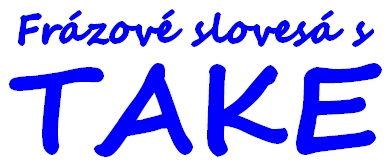
TAKE AFTER

byť po kom, byť podobný komu
TAKE AFTER používame vtedy, ak sa mladší člen rodiny podobá na staršieho člena rodiny (napr. vlastnosťami alebo výzorom).
- I don’t take after my mother at all.
- Who do you take after in your family?
TAKE APART
rozložiť, rozmontovať
- I am taking my bicycle apart to see what’s wrong with it.
TAKE BACK

vrátiť, odniesť (chybný / nevyhovujúci tovar do obchodu)
- The T-shirt was too small so I took it back.
vziať späť (odvolať niečo, čo sme povedali)
- I know I accused him of lying, but I take it all back.
TAKE (SOMEBODY) IN
ubytovať u seba
- We are going to take in two lodgers (= dvoch podnájomníkov).
zadržať (hlavne polícia)
- The police will take in your brother for questioning.
Vo význame “naletieť komu na čo“, “dať sa oklamať” - sa TAKE IN používa najčastejšie v pasíve. Teda BE TAKEN IN BY SB / STH.
- I was taken in by him.
- Too many pensioners were taken in by the government.
TAKE (SOMETHING) IN
porozumieť (v zmysle chápať)
- I couldn’t take in his explanation.
- It’s very difficult to take it in.
- There was so much information to take in from the text book.
zúžiť (oblečenie)
TAKE OFF

vzlietnuť (vznieť sa) (napr. lietadlo)
- The plane is due to* take off at 6.
- Being an astronaut is a lot of hard work and when planes take off it is probably one of the hardest jobs.
rozbehnúť sa / uchytiť sa (napr. biznis, autor, firma…)
- His new song has really taken off.
* Ak štruktúre DUE TO nerozumiete, prečítajte si tento článok – “BUDÚCNOSŤ”: Iné spôsoby vyjadrenia budúcnosti
TAKE (SOMETHING) OFF
vyzliecť si niečo, vyzuť si niečo
- When he came home he took his shoes off.
TAKE (SOMETHING) OUT
vytiahnuť, vybrať
- I will have to go to see the dentist to take my tooth out.
vybaviť si (zobrať si) (napr. pôžičku, poistenie apod.)
- It’s high time he took out an insurance policy. (= poistka)
- I didn’t want to take out a mortgage (= hypotéka) on my house but I had no option.
TAKE (SOMEBODY) OUT

pozvať niekoho niekam
- It was my intention (= mal som v úmysle…) to take her out for a dinner.
- My brother took his girlfriend out for a dinner.
TAKE OVER
prevziať, ovládnuť (napr. podnik apod.)
- He will take over the company after his father’s death.
TAKE UP
začať sa venovať čomu (nejakej činnosti)
- I took up playing football when I was six.
- I think we should take up softball or another sport that we could enjoy.
zaberať (čas, miesto apod.)
- This computer takes up too much space on my desk.
zaoberať sa čím (= prerokovať, čo)
- This issue will be taken up at the next meeting
- We can take up that part later when it becomes a problem.
TAKE TO

obľúbiť si koho / čo
- She took to my mother immediately.
- The first time we played football we took to it.
TAKE ON
prijať, nabrať si (zodpovednosť, náročnú úlohu)
- Don’t take on more than you can handle (= zvládnuť).
- Katy refused take on more responsibility.
TAKE (SOMEBODY) On
zamestnať
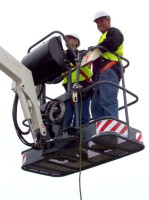
Ak niekto začne niekoho zamestnávať – teda niekoho zamestná, používame frázové sloveso TAKE ON.
- The shop has taken on 30 employees this year.
- They are planning to take on more workers during the season.
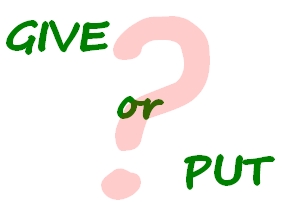
GIVE (sloveso) -> dať niečo (niekomu) - napr. či už nejaký predmet (hmotnú vec), alebo dať niekomu napr. radu (nehmotnú vec)
- Give me that pen.
- Could you please give her an advice what to do?
PUT (sloveso) -> položiť / dať niečo (niekde)
- She put her glasses on the shelf.
- Where did she put the key?
Teraz, keď sme sa oboznámili so základným významom týchto slov, môžme sa zamerať na časté chyby:
- Daj tú tašku na stoličku.

Ktoré z týchto dvoch slov by ste použili? Poviete si…
DAŤ niečo niekde -> DAŤ znamená GIVE, a teda:
Give that bag on the chair.
Je to však NESPRÁVNE. A prečo? Zamyslíme sa. V základnej definícii sme si povedali:
- GIVE -> dať niečo NIEKOMU (jedna osoba dáva niečo druhej osobe)
- PUT -> dať (položiť) niečo NIEKDE
Stolička je vec. My tú vec nedávame NIEKOMU, ale NIEKDE (na plochu stoličky), a preto PUT (nikdy nie GIVE)!
Ešte raz si to zopakujme:
- GIVE -> dať niečo niekomu
- PUT -> položiť niečo (= predmet) niekde (na stôl, podlahu, pohovku, stoličku apod.)
Iné významy a časté väzby (pre pokročilejších):
PUT (= to write sth) = zapísať si (čo)

- She was asked to put her name down.
PUT (= to express sth) = vyjadriť sa slovami
- Jane wanted to tell him how much she had missed him but she didn’t know how to put it into words.
GIVE (= to cause sth) = spôsobiť niečo

- The warm weather gave me an appetite.(= The warm weather made me hungry.)
GIVE (to organize sth) = organizovať
- They were giving the best parties ever.
GIVE (= to try sth)
- You’re clever enough to go to university, you should definitely give it a go. (…, mal by si to určite vyskúšať.)
REPORTED SPEECH
http://www.myenglishpages.com/site_php_files/grammar-exercise-reported-speech.php
http://www.usingenglish.com/quizzes/102.html
http://www.examenglish.com/grammar/B1_reported_speech.htm
Zmeny v nepriamej reči
Zmeny (slovesných) časov
Pri tvorbe nepriamej reči z priamej reči sa na sloveso po uvádzacej vete v minulom čase (napr. She told me that …) uplatní súslednosť časov. Výrok z priamej reči posúvame v nepriamej reči o jeden čas “naspäť”:
- prítomný čas jednoduchý → minulý čas jednoduchý
- prítomný čas priebehový → minulý čas priebehový
- predprítomný čas jednoduchý → predminulý čas jednoduchý
- predprítomný čas priebehový → predminulý čas priebehový
- minulý čas jednoduchý → predminulý čas jednoduchý
- minulý čas priebehový → predminulý čas priebehový
- budúci čas s “WILL” → would
- be going to → was / were going to
PRIAMA REČ NEPRIAMA REČ “I study hard,” he said. He said (that) he studied hard. “I am studying hard,” he said. He said (that) he was studying hard. “I have studied hard,” he said. He said (that) he had studied hard. “I have been studying hard,” he said. He said (that) he had been studying hard. “I studied hard,” he said. He said (that) he had studied hard. “I was studying hard,” he said. He said (that) he had been studying hard. “I will study hard,” he said. He said (that) he would study hard. “I am going to study,” he said. He said (that) he was going to study hard. - He told me he had hated science at school. (= veta v priamej reči: “I hated science at school.“)
Minulý čas jednoduchý sa mení na predminulý, no často ho pri prevode z priamej do nepriamej reči môžeme vo vete ponechať bez zmeny, najmä vtedy, ak veta obsahuje príslovkové určenie času alebo čas je z kontextu logicky známy a jasný.
- All students knew (that) the war (had) started in 1939.

Predminulý čas sa nemení!
Minulý priebehový ostáva zvyčajne bez zmeny, ak ho prevádzame do nepriamej reči.
- “I was cooking the dinner while Peter was listening to the radio.” → He said he was cooking the dinner while Peter was listening to the radio.
Predminulý čas v nepriamej reči sa môže vzťahovať až k trom odlišných časom v priamej reči. Presný význam nám vždy naznačí kontext, z ktorého daná veta pochádza:
- “I‘ve done my homework.” → She said she‘d done her homework.
- “I did my homework last week.” → She said she‘d done her homework the week before.
- “I‘d done my homework before, but I did it again.” → She said she‘d done her homework before.
Zmeny pri modálnych slovesách
- WILL → WOULD
- CAN → COULD (ALEBO WOULD BE ABLE TO)
- SHALL → WOULD
- SHALL v ponukách a návrhoch → SHOULD
- MAY (ak vyjadruje “možnosť”) → MIGHT
- MAY (ak vyjadruje “povolenie”) → COULD
- MUST (ak vyjadruje “istotu”) → bez zmeny
- MUST (ak vyjadruje “povinnosť”) → HAD TO / MUST
- COULD / MIGHT / OUGHT TO / USED TO / WOULD → bez zmeny
PRIAMA REČ NEPRIAMA REČ “I will study hard,” he said. He said (that) he would study hard. “I can sing very well,” he said. He said (that) he could sing very well. “We shall help you,” he said. They said (that) they would help me. “”Shall I open the window,” he said. He aked if he should open the window. “I may be back later,” he said. He said (that) he might be back later. “You may do it,” he said. He said (that) we could do it. “He must have some problems,” she said. She said (that) he must have some problems “I must do it,” he said. He said (that) he had to do it. Zmeny pri príslovkách
Príslovky a príslovkové určenia z priamej reči do nepriamej meníme nasledovne:
PRIAMA REČ NEPRIAMA REČ here there now then / at that moment today, tonight, this morning / week … that day, that night, that morning / week … tomorrow the next / following day yesterday the day before, the previous day ago before last night / month the night / month before, the previous month next week / year the next / following week / year - ‘I’ll wait for you here tomorrow,’ I said. → I told her I would wait for her there the next / following day.

Keď zámena THIS / THESE používame v príslovkových určeniach času, meníme ich na THAT / THOSE.
- this month → that month
- these years → those years
Ak tieto zámena nie sú súčasťou príslovkových určení časov, postupujeme nasledovne. Porovnajte!
- “This book is interesting,” Fiona told me.
→ Fiona told me (that) the book was interesting
Ak THIS / THESE / THAT / THOSE používame ako “prídavné meno” - nachádza sa pred podstatným menom, nahrádza ho v nepriamej reči “THE“.
- “This is an interesting book,” Fiona said.
→ Fiona said (that) it was an interesting book.
Ak THIS / THESE / THAT / THOSE používame ako “zámeno” - nenachádza sa pred podstatným menom, nahrádza ho vo v nepriamej reči “IT“, poprípade “THEY / THEM“.
Zmeny pri zámenách
Zámena sa v nepriamej reči pri reprodukovaní výroku z priamej reči menia podľa toho, kto reprodukuje koho priamu reč. Dôležitým faktorom je aj to, komu ju reprodukuje. Všetky tieto zmeny vychádzajú vždy z daného kontextu. Všimnite si!
- “I love you.” sa v nepriamej reči zmení na napr. She said she loved me.
V priamej reči máme zámeno “I”- je to človek, ktorý výrok hovorí. Ak vetu prevedieme na nepriamu reč, musíme i toto zámeno zmeniť. Ak nemáme kontext, je veľmi komplikované určiť kto – komu niečo hovorí, preto sa vždy riadime podľa kontextu.

Kedy k zmene (slovesných) časov nedochádza?
Ak sloveso (said, told apod.) uvádzajúce nepriamu reč je v prítomnom čase.
Prítomný čas v uvádzajúcej vete vyjadruje, že výrok padol iba nedávno a je stále relevantný / aktuálny. V takýchto prípadoch nedochádza k zmene časov.
- “I‘m hungry.” → Peter says he‘s hungry.
Ak výrok obsahuje všeobecné pravdy, stále stavy apod.
- “Water boils at 100 °C.” → She said that water boils at 100 °C.
Ak hovoriaci reprodukuje výrok hneď po tom ako bol vyslovený.
- “I will take a bus,” she said. → She said she will take a bus. (bezprostredné / okamžité reprodukovanie, ktoré je aktuálne)
- “I will take a bus,” she said. → She said she would take a bus. (neskoršie reprodukovanie, ktoré je už neaktuálne)
Ak niečo, čo hovoriaci povedal stále platí (je aktuálne). Toto použitie sa vzťahuje hlavne na situácie, kedy je v priamej reči budúci čas. V takom prípade ho bez zmeny ponechávame aj v nepriamej reči.
- She said that she will cook the dinner. – Povedala, že mi uvarí – stále na to čakám.
- She said that she would cook the dinner. – Povedala, že mi uvarí – už na to nečakám (buď mi už navarila alebo nie)
Ak reprodukujeme vety, ktoré obsahujú druhý alebo tretí kondicionál.

- Druhý kondicionál: “If I won the lottery, I would travel the world,” she said.
→ She said (that) if she won the lottery, she would travel the world.
- Tretí kondicionál: “If I had taken a taxi, I wouldn’t have missed the plane,” she said.
→ She said (that) if she had taken a taxi, she wouldn’t have missed the plane.
Ak reprodukujeme výrok, ktorý je v podstate citátom.
- Dalai Lama said that we can never obtain peace in the outer world until we make peace with ourselves.
Ak reprodukujeme nejaký príbeh / historku, nie je za potreby meniť minulý čas na predminulý.
- “I was waiting for my wife, and I saw what happened,” he said.
→ He said he was waiting for his wife and saw what happened.
PAST PERFECT (SIMPLE AND CONTINUOUS)
Predminulý čas jednoduchý & Predminulý čas priebehový
Základná stavba

- someone had played
ZÁPOR:
- someone had not played
OTÁZKA:
- had someone played?

- someone had been going
ZÁPOR:
- someone had not been going
OTÁZKA:
- had someone been going?
Predminulý čas jednoduchý (past perfect simple)
Predminulý čas používame vtedy, ak chceme ujasniť, že dej, o ktorom hovoríme, prebehol ešte pred nejakým iným minulým dejom.
- I knew I had forgotten my keys.

Ak sa nad predminulým časom zamyslíte, určite si položíte jednu dôležitú otázku. Ako by sa veta zmenila, ak by sme namiesto predminulého času použili obyčajný minulý čas. Pozrite sa na nasledujúci príklad:
1. When we arrived, the film had started.
2. When we arrived, the film started.
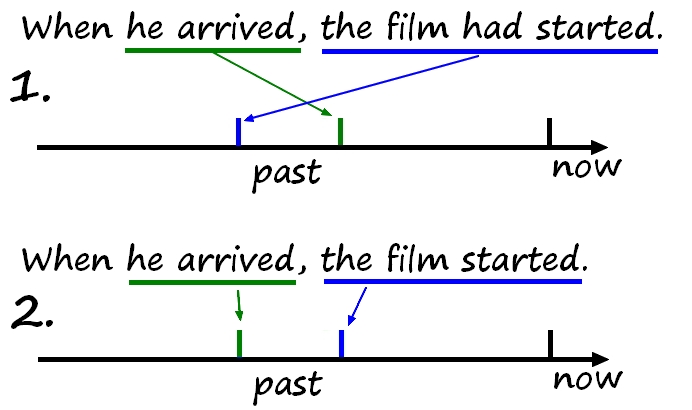
1. V prvej vete uvádzame, že keď sme prišli, film už bežal (začal pred našim príchodom). V tejto vete zdôrazňujeme to, že začiatok filmu sme napr. nevideli – začiatok sa odohral pred našim príchodom.
2. V druhej vete uvádzame, že sme najprv prišli a potom film začal. Minulý čas nám hovorí o tom, ako sa deje odohrali v chronologickom poradí (ako šli presne za sebou – jeden po druhom).
Predminulý čas používame pre ukončené deje, ktoré mali viditeľné výsledky v minulosti.
- My mother was very happy because she had met him.
Predminulý čas používame rovnako so slovesami HOPE / INTEND / EXPECT, ak hovoríme o plánoch, ktoré neboli splnené / uskutočnené:
- I had hoped to talk to him but he was not at home.
Predminulý čas môžeme použiť aj vo vetách, kde priamo uvádzame čas.
- I got to work at six but John had arrived at five.
Porovnajte rovnako PRESENT PERFECT s PAST PERFECT:
- The window is open. I have opened it.
- The window was open. I had opened it.
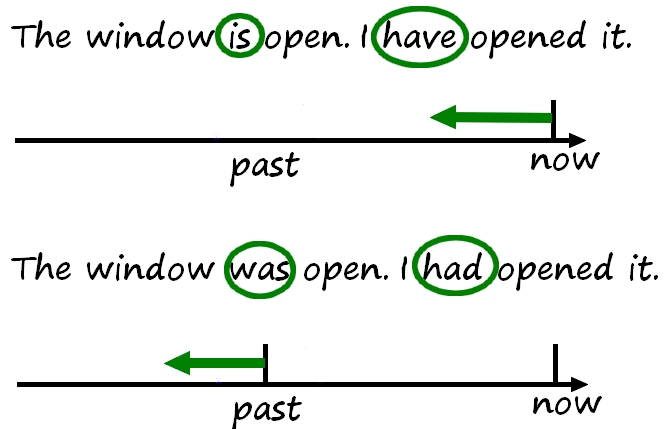
PAST PERFECT SIMPLE and PAST SIMPLE
Predminulý čas jednoduchý vs. minulý čas jednoduchý
1) Predminulý čas nepoužívame vtedy, ak hovoríme, že niečo jednoducho v minulosti (pred nejakým časom) prebehlo.
- I am reading an interesting book. I borrowed it from the library yesterday. (! NIE
I had borrowed it from the library yesterday.) – nie je tu potreba použiť predminulý čas
2) Predminulý čas nepoužívame vtedy, ak popisujeme deje, ktoré sa odohrali jeden za druhým. Ak sa však nejaký z chronologického poradia vymaní, predminulý použiť môžeme.
- My father got in the car, started the engine and looked at us.
Najprv nasadol do auta, potom ho naštartoval a neskôr sa na nás pozrel. – takto sa deje v skutočnosti odohrali.
Predstavme si inú situáciu: Prídeme do školy, tašku položíme na stôl, otvoríme ju, vybalíme si veci a v tom si všimneme, že sme kľúče nechali doma.
Všetky deje idú pekne za sebou, odohráva sa jeden dej za druhým, avšak dej “zabudnutia kľúčov” sa odohral pred všetkými ostatnými – preto pre tento konkrétny dej použijeme predminulý čas (…..I realized I had left my keys at home.)
3) Spojky AS SOON AS, WHEN, ONCE a ďalšie…Tieto spojky používame vtedy, ak hovoríme o dejoch, ktoré sa udiali jeden po druhom. Predminulý čas v týchto vetách nie je potrebný, pretože sa v rozprávaní posúvame od jedného deja k druhému. Deje nasledujú v chronologickom poradí, z vety je to viditeľné:- After she wrote the letter, she went out.
V týchto vetách však môžeme použiť aj predminulý čas bez výraznej zmeny vo význame:
- After she had written the letter, she went out.
Ak je našim cieľom zdôrazniť, že dej vo vedľajšej vete nemá priamy súvis s dejom v hlavnej vete, je od deja v hlavnej vety oddelený / nie je na ňom závislý – používame predminulý čas.
-
- After he had cleaned the car, he went for a walk for an hour.
Ak však chceme zdôrazniť, že druhý dej je výsledkom prvého, preferujeme použiť minulý čas jednoduchý pre oba deje:
- Virginia Evans became famous after she published her work.
BY s predminulým časom
Predminulý čas používame často s BY + určitým časom, ak chceme vyjadriť, čo sa do danej doby stalo.
- I had completed my studies by 2010.
BY sa nachádza často aj vo väzba BY THE TIME (THAT). Predminulý čas umiestňujeme do hlavnej vety, pričom hneď po BY THE TIME (THAT) sa používa minulý čas.
- By the time we arrived, the film had already started.
Predminulý čas priebehový (past perfect continuous)
1) Dej, ktoré prebiehal určitý dobu pred nejakým iným minulým dejom.
- We had been waiting there for more than three hours when they finally arrived.
- She had been working there for two years when she broke her leg.
2) Jeden dej viedol k inému deju
- My legs hurt because I had been plaing football all day. - Aký dej viedol k stavu “bolesti nôh” – dej hrania futbalu
Rovnaké použitie nájdeme aj pri PRESEN PERFECT. Porovnajte:
-
- My T-shirt IS dirty. I HAVE been working in the garden.
- My T-shirt WAS dirty. I HAD been working in the garden.
3) Dôraz na trvaní deja
Ak dávame dôraz na čas, počas ktorého dej prebiehal používame predminulý priebehový čas.
Ak je pre nás výsledok / efekt deja dôležitejší, použijeme predminulý čas jednoduchý.
- She‘d been working in the garden. She was dead tired. (= dôraz na trvaní deja)
- She‘d worked in the garden. It looked great. (= dôraz na výsledku deja)
Ak hovoríme o tom ako dlho sa niečo dialo do nejakého bodu v minulosti, kladieme si teda otázku HOW LONG – používame predminulý čas priebehový.
Ak hovoríme o tom, koľko krát sa niečo udialo do nejakého bodu v minulosti, kladieme si teda otázku HOW MUCH / HOW MANY - používame predminulý čas jednoduchý.
- She had been playing football for 3 hours when they arrived. (= for 3 hours…)
- I‘d heard the result many times before. (= many times…)
Porovnajte PREDMINULÝ ČAS PRIEBEHOVÝ a MINULÝ ČAS PRIEBEHOVÝ:
- When we came, they had been watching TV. (= prišli sme po tom, čo dopozerali TV – dej pozerania TV prebehol pred našim príchodom)
- When we came, they were watching TV. (= prišli sme a oni práve pozerali TV – dej prebiehal počas toho ako sme prišli)
PAST PERFECT and PAST SIMPLE
http://www.englishguide.sk/minuly-cas-jednoduchy-priebehovy-vs-predminuly-cas/
MINULÝ ČAS (jednoduchý / priebehový) vs. PREDMINULÝ ČAS
- When Lisa arrived home, John did his homework.
- Keď Lisa prišla domov, John si napísal svoje domáce úlohy.

MINULÝ ČAS JEDNODUCHÝ sme použili v oboch vetách. Prečo? Pretože MINULÝ ČAS JEDNODUCHÝ používame vtedy, ak chceme uviesť deje v takom poradí, v akom sa odohrali (jeden po druhom).
- NAJPRV Lisa prišla domov, POTOM John začal písať jeho domáce úlohy.
- When Lisa arrived home, John was doing his homework.
- Keď Lisa prišla domov, John si práve robil svoje domáce úlohy.

V jednej vete sme použili MINULÝ ČAS JEDNODUCHÝ, v druhej vete naopak MINULÝ ČAS PRIEBEHOVÝ. Prečo? Tieto dva časy používame veľmi často v kombinácii (ako vidíme vyššie). V určitý okamih v minulosti istý dej PREBIEHAL. Prebiehajúci dej v angličtine často určujeme časovým určením (THIS TIME YESTERDAY, AT 6.30 …) alebo iným dejom, ktorý do UŽ prebiehajúceho deja vstúpil.
Pre DLHŠÍ (už prebiehajúci) dej používame MINULÝ ČAS PRIEBEHOVÝ a pre KRATŠÍ (náhle vstupujúci) dej používame MINULÝ ČAS JEDNODUCHÝ.
Dej vyjadrený MINULÝM ČASOM PRIEBEHOVÝM začal EŠTE PRED dejom vyjadreným časom JEDNODUCHÝM. Rovnako si treba uvedomiť, že tento DLHŠÍ dej prebiehal i počas toho ako nastal KRATŠÍ dej.
- NAJPRV začal John písať svoje úlohy a písal ich aj počas toho ako prišla Lisa. V momente, keď Lisa prišla, tento dej PREBIEHAL. Lisa ho teda videla úlohy robiť.
- When Lisa arrived home, John had done his homework.
- Keď Lisa prišla domov, John už mal úlohy napísané.

V jednej vete sme použili MINULÝ ČAS, v druhej vete naopak PREDMINULÝ ČAS. Prečo? Ak chceme v minulosti upresniť a ujasniť, že istý dej sa neodohral chronologicky za predošlým, ale že sa odohral ešte PRED ním, musíme použiť PREDMINULÝ ČAS.
Poradie viet v anglickej vete, nezodpovedá presnej skutočnosti ako tieto deje prebehli. PREDMINULÝ ČAS nám bližšie určí, ktorý dej začal / prebehol a celý sa UKONČIL než začal iný dej.
Ak chceme hovoriť o všetkom, čo sa dejovo stalo a aj ukončilo pred LISA ARRIVED HOME, musíme použiť PREDMINULÝ ČAS.
- NAJPRV John napísal úlohy, POTOM prišla LISA. Johna úlohy písať nevidela. Tento dej prebehol a ukončil sa ešte PRED jej príchodom.
Porovnajte:
- When I got to the cinema, the film started. (NAJPRV som prišiel do kina, POTOM začal film.)
- When I got to the cinema, the film had started. (NAJPRV začal film, POTOM som prišiel do kina ja.)
IS ENGLISH EASY............ ?
1 To ____________________ means to manage to live without things that you would like to have.
A take do
B go do
C create do
D make do
2 _________________________ is a set of official rules and bureaucracy that make it difficult to do something.
A Slow tape
B Stop tape
C Waiting tape
D Red tape
3 To __________________________________ of something means to understand the real causes of a situation.
A get to the beginning
B get to the bottom
C get to the root
D get to the point
4 If you're _____________________________________ for something, you're ready to do it.
A all done
B all made
C all set
D all ready
5 If you __________________________, you show that you do not like something by making an unpleasant expression.
A show a tongue
B fake a laugh
C make a face
D turn a head
6 A ___________________________-is something which requires no thought or effort.
A no-thinker
B no-senser
C no-minder
D no-brainer
7 If you ________________________________, you refuse to change your opinion or behaviour.
A stand your ground
B defend your land
C keep your spot
D hold your place
8 If you ___________________________, you describe it using as few words as possible.
A place something in a drawer
B put something in a nutshell
C close something in a box
D insert something in a jar
9 If you do something in a _________________________ way, you do it in a very cruel way with no emotion.
A warm-hearted
B cold-blooded
C cold-hearted
D warm-blodded
10 To _________________________ means to be willing to take needless risks.
A have a risk wish
B have a death wish
C have a kill wish
D have a grave wish
11 When something that you did not understand ____________________, it suddenly becomes easy to understand.
A falls on the table
B falls under the bed
C falls out of the window
D falls into place
12 If something is ________________________, it's very clear and easy to understand.
A strong and steady
B safe and sound
C done and ready
D loud and clear
13 Please hand me that ______________________ so I can pound these nails in.
A hammer
B pounder
C hitter
D banger
14 This might be the last time we have to ________________________ leaves before it snows.
A rake
B sweep
C shovel
D mop
KEY:
1D 2D 3B 4C 5C 6D 7A 8B 9B 10B 11D 12D 13A 14A
1 make do = get along with the means available, 2 red tape = rules and bureaucracy that delay results, 3 get to the bottom = understand the causes of something, 4 all set = ready to do something, 5 make a face = make an unpleasant expression, 6 no-brainer = something which requires no thought or effort, 7 stand your ground = refuse to change your opinion or behaviour, 8 put in a nutshell = using as few words as possible, 9 cold-blooded = cruel; without emotion,
10 have a death wish = take needless risks; live dangerously on purpose, 11 fall into place = suddenly become easy to understand, 12 loud and clear = very clear and easy to understand
-
Kontakty
- Stredná odborná škola polygrafická
- +421 2 49209220
- Račianska 190 www.polygraficka.sk 835 26 Bratislava Slovakia
- 00894915
- SK2020325186
Prihlásenie
Powered by aSc EduPage